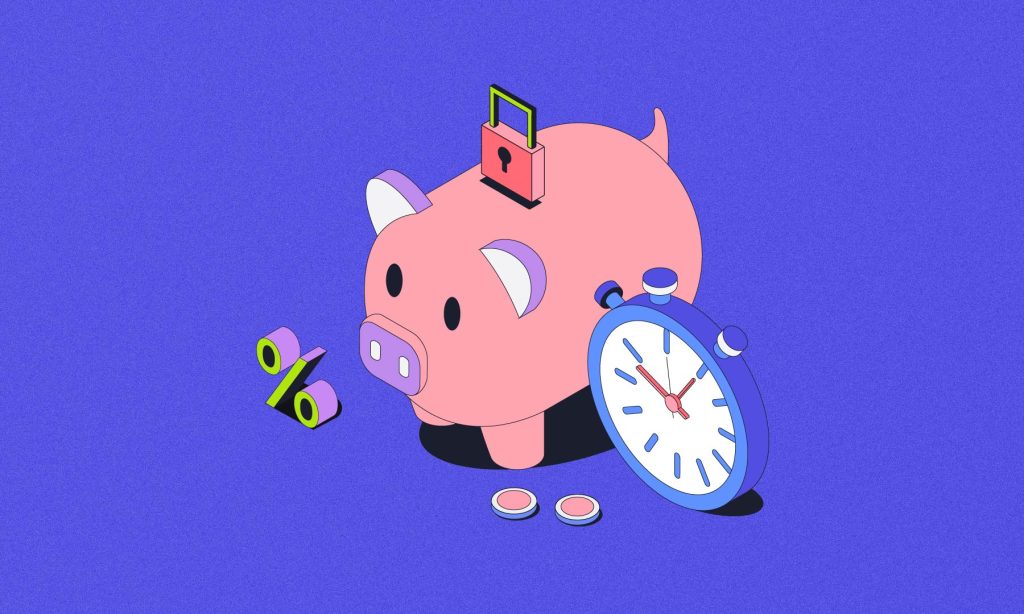Are you looking to invest safely and securely while retaining liquidity? Well, then, look no further than short-term fixed deposits (FDs). That’s just a figure of speech. Please look. You must. We mean it may be a good option for you. Short-term FDs let you earn guaranteed returns over a shorter period, making safety and liquidity their second and third names. Short-term FD rates are great too. Keep reading to learn more about them.
Understanding short-term fixed deposits
At their core, short-term fixed deposits are a type of account that offers a fixed interest rate for a short but predetermined period. They are unlike regular savings accounts because the latter offers variable interest rates.
Components of short-term FDs
There are several components of short-term fixed deposits. Here’s where we break them down for you.
- Period: Firstly, the deposit period determines the interest rate you earn. Typically, short-term fixed deposits have a maturity period of anywhere from one to twelve months. The longer the period, the higher the interest rate.
- Interest rates: Shop around to find the best FD interest rates. This will significantly impact the returns you earn. Short-term fixed deposits shine here, often offering higher interest rates than regular savings accounts.
- Facility for renewal: Facilities for renewal are also an important consideration. Many short-term deposits offer the option to renew the account at the end of the term. You can choose to reinvest just the funds or the funds and interest. This is very convenient if you want to continue making returns in the long term.
- Minimum limit: Most short-term fixed deposits require a minimum investment amount. The amount varies depending on the bank or financial institution offering the product.
- Option to nominate: Many short-term fixed deposits offer the opportunity to nominate a beneficiary. Doing this ensures that in case you die, you can rest in peace, knowing that your money is where you want it to be.
Eligibility for the short-term FD
Some banks would offer Non-Resident Indians the option of opening short-term FDs, but most require you to be a resident Indian. To set up the account, you must submit copies of identity proof, address proof, and a few passport photos. So you would need to have these documents up to date and at hand.
Short-term fixed deposit interest rates
These FDs offer attractive interest rates. The rate is usually higher than that for a savings account. It is, however, lower than longer-term FDs. The rate at present is in the 2.8–5.5% range. Axis Bank, SBI, Equitas, Bajaj Finance, HDFC, and ICICI offer some of the highest interest rates at press time.
How to open a short-term fixed deposit account
Opening a short-term fixed deposit account is a straightforward process.
- All you need to do is visit your bank’s website or walk into their branch and fill out the application form.
- You must provide the aforementioned KYC documents and deposit at least the minimum amount to open the account.
- Once your account is open, you are set to earn attractive interest rates on your savings.
Benefits of investing in a short-term deposit
A short-term FD is an excellent investment option for those who want to earn better interest on their savings without losing sight of liquidity.
- High safety: Short-term FDs are a safe investment option because they offer guaranteed returns on the investment. Besides, they are unaffected by market volatility.
- Ideal for short-term savings: Short-term FDs are a great alternative for those looking to invest for the short term while they save up for a vacation, a down payment for a house, or a child’s education.
- Better liquidity with a high rate of return: Compared to long-term FD accounts, short-term FDs offer lower interest rates, but they make up for it with the great liquidity they offer. Short-term FDs have better liquidity due to their short maturity period. The liquidity makes them a desirable investment.
- Option to withdraw money before maturity: Investors can withdraw their funds before maturity, but a penalty may apply.
Conclusion
Short-term fixed deposits are an excellent investment option for anyone looking to earn guaranteed returns while ensuring better liquidity. With a little research, you can find the best FD interest rates. We hope we’ve motivated you to get started.
FAQs
How long does a short-term fixed deposit have to be open?
Banks have different minimum tenure requirements for short-term fixed deposits, although generally speaking, it is between seven days and a year.
What is the difference between a short-term fixed deposit and a savings account?
The interest rate on a short-term fixed deposit is often higher than that on a savings account, but the funds are locked in for a set time in the former case. A savings account, on the other hand, offers quicker access to your money.
Can I get my money from a short-term fixed deposit before expiration?
Yes, most banks let you take money out of short-term fixed deposits. However, extra fees may be involved.
Is short-term FD better than long-term?
Short-term FDs offer liquidity and flexibility but lower interest rates. Long-term FDs provide higher returns but require a longer commitment. The choice depends on your financial goals and risk tolerance.
What is the difference between FD and short-term deposit?
Fixed Deposits (FDs) are long-term investments with higher interest rates and fixed tenors, often several years. Short-term deposits have shorter tenors, typically ranging from days to a few years, offering lower interest rates.
Is short-term FD taxable?
Yes, interest income from short-term Fixed Deposits (FDs) in India is taxable. It is added to your total income and taxed at applicable slab rates following prevailing tax laws.
What is short-term FD in bank of India?
A short-term FD in Bank of India is a fixed deposit account with a deposit period of less than or equal to one year or 12 months. It offers competitive interest rates.








